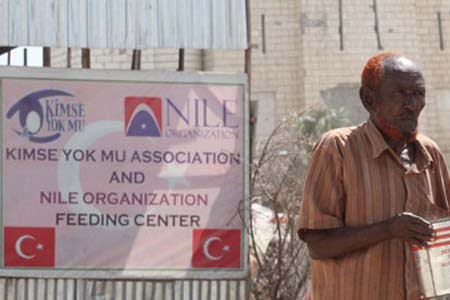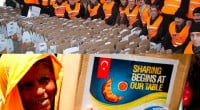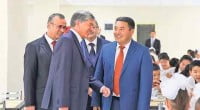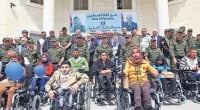How Turkey is emerging as a development partner in Africa

Date posted: April 10, 2013
Turkey has emerged as a generous donor for humanitarian crises across the world over the past five years, especially in the context of Africa.
In 2011, while official development assistance (ODA) fell in 16 DAC countries, Turkey’s net ODA increased by over 38%. Following the ‘Turkey – Africa Co-operation summit‘ in Istanbul in August 2008, the African Union declared Turkey a ‘strategic partner’ and in May 2010, Istanbul was the venue for the 4th UN Conference on the Least Developed Countries (LDCs).
Though Turkey is relatively new in African politics, trade and aid circles, it has already expanded its area of influence in the continent by linking its soft power tools of transportation links, trade and education closely with its foreign policy.
In the most simplified terms, this is the process undertaken by Turkey: once an African country is identified for bilateral relations by the Turkish foreign ministry, a diplomatic presence will be established, Turkish Airlines will launch a flight destination and economic links will be formed by globally active Turkish companies.
Meanwhile, the foreign ministry might sign an agreement to ease the existing visa regime to increase interaction in commerce, academia and culture. A number of Turkish schools run by the Gulen Movement – highly sought after by local communities – also play an active role in consolidating relations and the Turkish government may provide scholarship opportunities for graduates of these schools to take a university degree in Turkey.
Though some of these measures are fairly traditional means of forming bilateral relations for other donor countries, what Turkey seems to do differently is that it joins up its efforts in the realms of diplomacy, economics, trade, culture and education.
In Somalia, for example, Turkey has become the largest donor among non-OECD-DAC countries and one of the most active actors in humanitarian aid and peace-building. There are a number of reasons for Somalia to become an interest for Turkey in this way, including geopolitical interests, socio-cultural and religious ties and Turkey’s wider business interests in Africa as well as Turkey’s newly gained confidence in tackling global challenges.
In August 2011, Turkish prime minister Recep Tayyip Erdoğan, accompanied by a large entourage, travelled to Somalia to raise awareness among the international community of the ongoing conflict – the first non-African leader visiting Somalia over the past two decades. The visit brought Somalia back to the attention of a number of other donors, as it received a huge coverage by international media. For Turkey’s internal politics too, such high profile coverage meant strong public support for the Somalia aid campaign and popularity for the governing party.
Turkish aid organisations such as Turkish Red Crescent (Kızılay) and the Turkish International Cooperation and Development Agency (TIKA) are highly active in a wide range of infrastructure, welfare and service sector programmes in the country such as clearing rubbish, providing clean water, building hospitals and running the Mogadishu’s permanent settlement for displaced Somalians. In 2011, the Turkish government donated $49m (£32m) to Somalia, but its successful mobilisation of private donations resulted in another sum of $365m. In 2012, over 1,200 Somali students received full scholarships to study in Turkey with a budget of nearly $70m.
One key to Turkey’s success is that it has much more presence in the streets of Mogadishu than many other actors. Some UN agencies and international NGOs have been running their programmes through remote management from Nairobi due to security challenges, however Turkish officials and aid workers have continued to work in the city. This is because Turkey has established a high level of trust within government, various armed groups and war-torn communities. Its Islamic background is also an important factor, according to Kilian Kleinschmidt, the UN’s deputy humanitarian co-ordinator in Somalia.
So, the Somalia experience shows that Turkey’s main strength in response to peace-building challenges is the way it uses its different capacities and resources in a co-ordinated way; providing assistance for relief aid and reconstruction, but also working with Somalia as a business partner and investing in the youth education.
However, this is not going to be a trouble free journey for Turkey. Although a joined up humanitarian strategy co-ordinated by its ministry of foreign affairs seems to increase effectiveness on the ground, Turkey may have to face tough future questions on the ethics of such a strategy, due to the dual principles of neutrality and impartiality for humanitarian responses.
Also, being an emerging power and getting involved in humanitarian crises around the world demands a sophisticated aid strategy and there is a huge need for Turkey to learn from the experiences of traditional donors such as US, EU countries and Japan. Avoiding their mistakes is key, but at the same time, there is no point in re-inventing the wheel.
Turkey hasn’t yet come to terms with the fact that it would make more sense to work with these actors and take a co-ordinated response rather than going it alone as often it does. In the long-term this is likely to create unnecessary tensions. If it wants to become a long-term player in the field of humanitarian response, Turkey will need as many friends as possible.
Professor Alpaslan Özerdem is director of the Centre for Peace and Reconciliation Studies at Coventry University. He tweets as @AlpOzerdem
Source: TheGuardian, April 10, 2013
Tags: Africa | Humanitarian aid | Somalia |
























